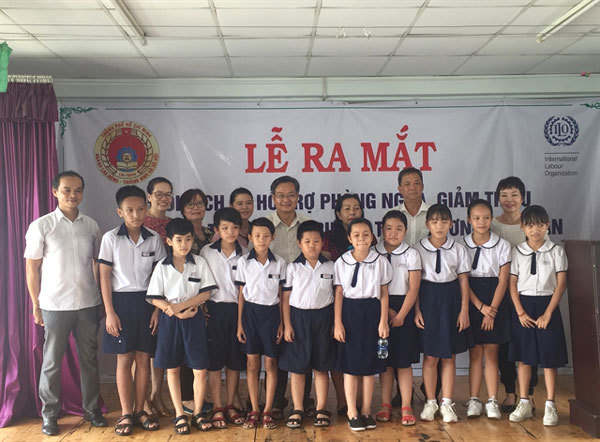Vocational schools need more links with employers
Taekwondo club: confidence-booster for disadvantaged kids
 |
| A programme to eliminate child labour has been launched at Thien An School in HCM’s Binh Tan District. — VNS Photo Ngoc Diep |
The model provides vocational training for disadvantaged people and free lunch, health insurance, learning tools, extracurricular activities, and a library with 500 books for their children.
It is part of a five-year International Labour Organisation (ILO) programme ending next year, Enhance, for improving national competitiveness to eliminate child labour in Vietnam.
It is being implemented by the Ministry of Labour, Invalids and Social Affairs with support from the ILO and UNICEF mainly in Hanoi, HCM City and An Giang Province.
In HCM City, nearly 1,500 children working in Tan Binh, Binh Tan, Tan Phu and Cu Chi districts have benefited from the project.
Tran Ngoc Son, deputy director of the city Department of Labour, Invalids and Social Affairs, said the programme is expected to significantly contribute to eliminating child labour.
He called on individuals and organisations to help sustain this model after the programme ends next March.
A national survey conducted by the Government in 2012 found 1.75 million children between the ages of five and 17 working.
Around 80 per cent of them were working in small manufacturing establishments and businesses, mostly part-time.
Many parents send their children to work early to augment the family income without realising they are violating the Labour Code.
According to the Labour Code, no one under 18 should be made to perform strenuous or hazardous jobs.
It only allows children aged between 13 and 15 with talent in sports, arts and other fields to work part-time to improve those skills.
Hoang Thu Huong, the project's coordinator from ILO in Vietnam, said: "Raising awareness among parents is the most important requirement to prevent child labour.”
It also needs more supportive policies and efforts from the Government to ensure disadvantaged people’s livelihoods and help children access education, she said.
If children are forced to work, their physical, mental and psychological development would be affected, she added.
VNS
 A training model that seeks to prevent child labour has been launched recently at Thien An School in HCM City’s Binh Tan District.
A training model that seeks to prevent child labour has been launched recently at Thien An School in HCM City’s Binh Tan District.